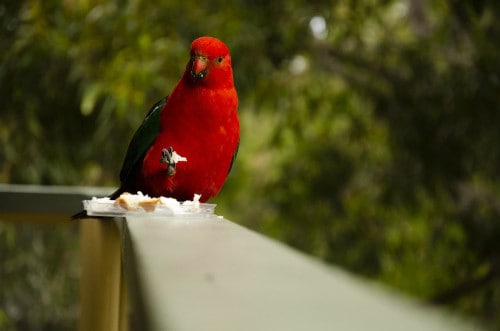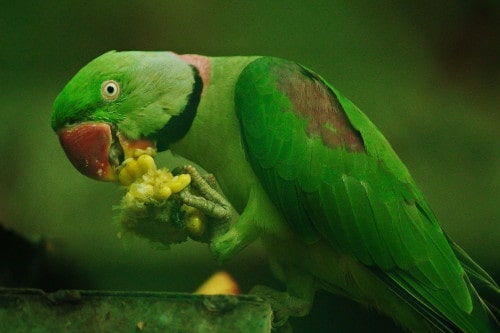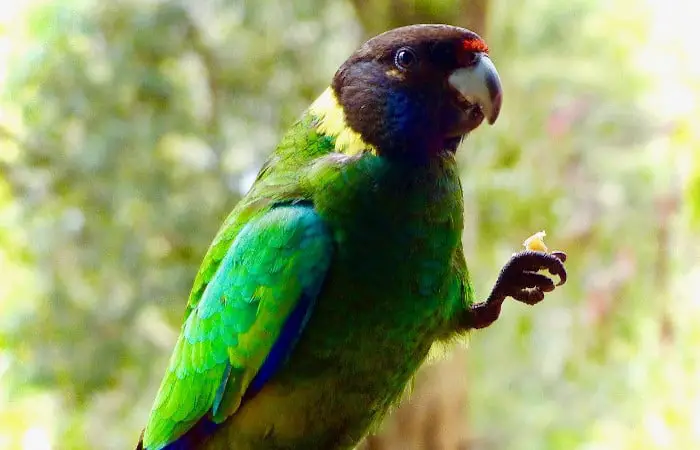How long can a parrot go without food? This is a question that many people are curious about. The answer may surprise you.
In this blog post, we will discuss how long they can go without food.
We will also explore some of the reasons why parrots may not eat for extended periods of time.
If you own a parrot or are thinking about getting one, this information is essential to know.
How long can a parrot go without food?
A parrot’s metabolic rate is determined by its size, with smaller birds having a higher metabolism and larger birds having a slower metabolism.
As a result, smaller birds need to eat more frequently, while larger birds can go longer without food.
On average, a parrot can go without food for 1-3 days.
Small parrots like parakeets and cockatiels can go without eating for about 1 day, while larger parrots such as macaws and African greys can go without eating for 2-3 days as they have a slower metabolism.
However, if a parrot is sick or stressed, its metabolism will increase, and it will need to eat more often.
Additionally, younger birds have a higher metabolism than older birds, so they may need to eat more frequently.
Ultimately, the best way to ensure that your parrot stays healthy is to provide it with a nutritious diet and plenty of access to food.
You may also like: How Long Can a Cockatiel Go Without Water?
How can you tell if your parrot is hungry?
As any pet owner knows, it can be difficult to determine if your parrot is hungry. However, there are some signs that your parrot may be hungry.
All parrots share some basic characteristics, one of which is the “head bobbing” behavior.
This is a way of showing they are interested in something, or in this case, that they are hungry.
When a parrot bobs its head up and down, it is trying to get your attention so that you will give it food.
If you see your parrot doing this, it is a sure sign that it is time to feed it.
Another way to tell if your parrot is hungry is by its behavior. If it is pacing back and forth or making loud noises, it is probably looking for food.
Paying attention to your parrot’s behavior is the best way to make sure it stays happy and healthy.
What are the factors affecting the survival of a parrot without food?
There are a number of factors affecting the survival of a parrot without food.
Parrot species and sizes
Parrots have higher metabolisms than other bird species, which means they burn through energy stores more quickly.
Smaller parrots cannot survive without food faster than larger parrots because of higher metabolisms.
This means that they burn through their energy stores more quickly, and thus need to eat more frequently than larger parrots.
Fat stores
Additionally, the type of food a parrot has eaten in the past can affect its ability to survive without food.
If a parrot has been eating a lot of fatty foods, it will have more stored energy to draw on in an emergency situation.
Activity level
Parrots that are more active and burn energy faster can survive without food for a shorter period of time than inactive parrots.
Temperatures
Finally, the temperature of the environment can also affect how long a parrot can survive without eating.
Parrots that are exposed to cool climates need more food to survive than those that are in warm climates.
As a result, parrots need to eat more often to maintain their health.
It is also important to make sure your parrot has a nutritionally balanced diet and plenty of access to food so that it can choose what it wants.
You may also like: How Do I Know If My Budgie Is Dying?
Why do parrots refuse to eat?

When your parrot suddenly refuses to eat, it can be worrying.
There are several potential reasons why this may happen.
New environment
If your parrot has recently been moved to a new environment, it may be hesitant to try new foods.
Don’t like the food
It’s also possible that they don’t like the food you’re offering them. Try offering them a variety of foods to see if they will eat anything.
Spoiled food
If the food is spoiled, your parrot will definitely not want to eat it. Make sure you are offering them fresh food that is within its expiration date.
Sickness
If your parrot is sick, it may not have an appetite. If you think this may be the case, take them to the vet to get checked out.
Stress
Parrots are very sensitive animals, and stress is a common reason why they may not eat. If you think your parrot is stressed, try to identify the source of the stress and remove it from its environment.
With some patience and trial and error, you should be able to find a food that your parrot enjoys and that meets its nutritional needs.
You may also like: Can Parakeets Die From Cold?
What to do if your parrot refuses to eat?

As any pet owner knows, a healthy diet is essential for maintaining your animal’s health and well-being.
When your pet stops eating, it can be a worrying time.
However, there are a few things you can do to encourage your parrot to start eating again.
First, check that there is nothing wrong with their food or water.
Sometimes, a change in diet can lead to a loss of appetite.
If their food and water are both fresh and clean, then try offering them a variety of different foods to see if they will eat anything.
You can also try offering them food from your own plate, as some parrots prefer human food.
Finally, if your parrot is still not eating, it is important to take them to the vet to rule out any medical causes.
With a little patience and perseverance, you should be able to get your parrot eating again in no time.
What are the signs of malnutrition in parrots?
Malnutrition is a serious problem that can affect parrots of all ages.
The most common signs of malnutrition include weight loss, poor feather quality, and weakness.
However, parrots may also show other less obvious signs of malnutrition, such as swelling around the eyes or loss of balance.
If you suspect that your parrot may be malnourished, it is important to seek veterinary care as soon as possible.
With prompt treatment, most parrots can make a full recovery.
However, if malnutrition is left untreated, it can lead to organ damage and even death.
Can parrots starve to death?
While it is true that parrots cannot live for long periods of time without food, they will eventually starve to death if they do not have immediate access to a proper diet.
Parrots are very active birds and need a lot of energy to maintain their metabolism.
Starvation will cause them to lose weight and eventually die.
If you are concerned that your parrot is not eating enough, or if you notice that it is losing weight, please contact your veterinarian at once for help.
Conclusion
How long can a parrot go without food? It depends on different parrot species and normally lasts for 1-3 days.
However, without food, parrots will eventually starve to death.
If you think your parrot is not eating enough or losing weight, please contact a veterinarian for help.
